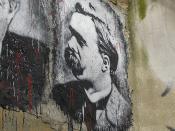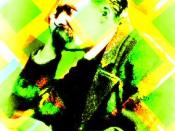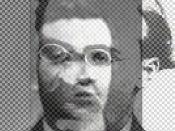Some call Friedrich Nietzsche the father of the Nazi party. Was Nietzsche's ideas twisted and warped by a needy country? Nietzsche himself despised the middle and lower class people. Was it Nietzsche's Will to Power theory that spawned one of the greatest patriotic movements of the twentieth century? These are some of the questions I had when first researching Friedrich Nietzsche for the following paper.
Friedrich Nietzsche, at one time called "the arch enemy of Christianity"(Bentley, p.82), was born into a line of Protestant Clergyman on October 15, 1844. During Nietzsche's early years, he gave no indication that he would not follow in his families' clergy tradition. As a boy, Nietzsche considered himself a devout Lutheran. At age six(two years after his father passed away)Nietzsche, his mother and sister moved to the small town of Naumburg. When Nietzsche was twelve he wrote "I saw God in all his glory"(Bentley, p.82).
Later his description of his own mental state was one of Gottergebenheit; "surrender to God"(Bentley, p.82). At a very early age Nietzsche had already displayed an aptitude for highly intellectual prowess. At fourteen, Nietzsche left his home of Naumburg and went to an exclusive boarding school at the nearby Schulpforta Academy. The school was famous for its grandeur of alumni that included "Klopstock and Fichte"(Brett-Evans, p.76). "It was here that Nietzsche received the thorough education in Greek and Latin that set him upon the road to classical philology."(Brett-Evans, p. 76) On many occasions Nietzsche's zeal to prove himself at the Pforta school spurned legendary tales. One certain tale is when Nietzsche "could not bear to hear of the courage of Mucius Scaevol, who did not flinch when his hand was burnt off, without seizing a box of matches and firing them against his own hand."(Bentley, p.84) At the age...


